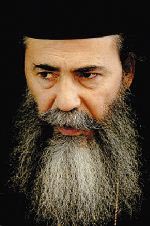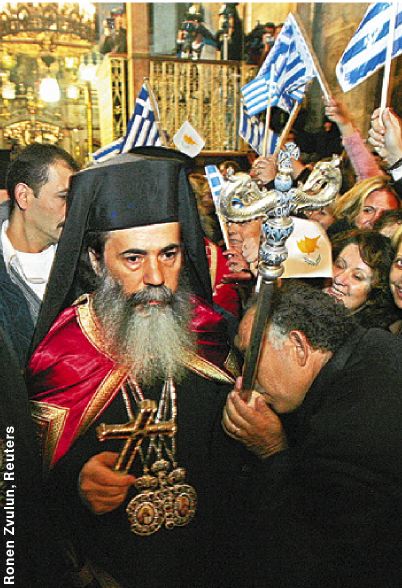 |
||
|
Unholy Land Crisis Assails Patriarch
|
||
|
The patriarch blasts economic interests behind Jordan's move to lift his recognition, warning all governments to respect religious freedom By George Gilson |
 |
|
| that Theophilos has not fulfilled pledges to give the Arab-speaking flock a larger say in church affairs. The Jordanian move comes days before an Israeli Supreme Court ruling, expected on May 21, which, Theophilos is convinced, will lead to his recognition by Israel. |
||
|
Theophilos of Jerusalem Speaks Out |
||
AN EXPLOSIVE mixture of land, money and nationalism has again stirred a major crisis in the Greek Orthodox Patriarchate of Jerusalem, the guardian of Christianity's most important shrines and a major landholder in the Holy Land. In an exclusive interview with the Athens News, Patriarch Theophilos charges that private financial interests are behind the Jordanian cabinet's May 12 decision to revoke his recognition, which must be approved by King Abdallah. The decision came shortly before the Israeli Supreme Court is due to rule on May 21 on Theophilos' petition to gain recognition from the state of Israel. |
||
|
Theophilos insists that representatives of about 70 Arab Orthodox communities who demanded the patriarch's recognition be revoked are in fact a non-representative group mainly from Nazareth, pursuing their own economic interests. One bishop told the Athens News that the same people for many years have been suing the patriarchate to gain control of parts of the church's vast landholdings. The daily To Vima reported on May 15 that King Abdallah's cousin, Prince Gazi bin Muhammad, has been pressuring Theophilos to hand over a large land tract for commercial development near the Jordan River, where pilgrims flock to be baptised. Confirming this, church sources told the Athens News that the prince is also pressuring Theophilos to elevate Arab Orthodox Archimandrite priest Christophoros to bishop. Theophilos refused to discuss the prince, but he suggests indignantly that he will resist Jordanian and Greek foreign ministry pressure to promote anyone in order to defuse the crisis. |
||
| The Jordanian government and the dissidents charge that Theophilos has not kept promises he had made before gaining election in 2005, when his predecessor, Eirinaios, was deposed after selling big properties in East Jerusalem to Israeli interests. The pledges include ordaining a second Arab Orthodox bishop, appointing a second Arab Orthodox clergyman to the governing synod and reviving a mixed clergy-laity council that will give the Arab flock a key say in church property administration (a move Israel opposes). |
||
The patriarch responds that he had ordained a second Arab bishop, the outspoken nationalist Theodosios Attalah (who now supports revoking Theophilos' recognition), and that another Arab Orthodox bishop simply died in the interim and has not yet been replaced. He suggests that he will appoint a second Arab Orthodox to the synod in due course, but not under external pressure. Theophilos declares that the pressure to develop church land in Jordan "has a very great and direct connection" to the government's move to lift his recognition. "The issue is not whether the land is valuable land. The patriarchate's property is inalienably linked to shrines, which is why we have not and will not exploit it commercially," he says. Stressing Israeli pressures to conclude property deals in return for recognition, Theophilos says that the Arabs are now copying the Israeli model. "The patriarchate has been pressured by Israel in connection with recognising me as patriarch. Until today, we said clearly to Israeli officials that we will not negotiate the patriarchate's interests," Theophilos says. "The patriarchate must be respected as an institution that is sacred, spiritual and religious. It must not be treated as a real-estate agency. I declared I am not a businessman, and if that does not suit them, that is their problem. "Unfortunately, while Israeli state authorities are now respecting the patriarchate, the issue is raised from a quarter from which we would expect absolute support and respect [the Arab side]," he says. Theophilos says that "there is no doubt" that the Israeli Supreme Court will rule to grant him state recognition, though he does not elaborate on the basis of this conviction. But his certitude suggests an understanding between the church and Israel. The patriarch insists that he enjoys the full support of the Arab flock and stresses the church's social offering. "The flock recognises our love and has no problem with me because they know me better than I know myself. We have proven the concern of the patriarchate. In Jordan, I have devoted the greater part of my energy since being elected. "We visited many communities, some of which said they hadn't seen a patriarch in 30 or 50 years. In the Jordanian city of Zarka, we built a whole school. We have repaired abbots' houses - in one case the abbot was living in a hostel - and other facilities, investing great sums despite the financial difficulties arising from Israel withholding recognition [Theophilos cannot access church bank accounts in Israel until he is recognised]. In Fhes (Jordan), we created an abbott's house and reorganised the community," he says. Theophilos insists that his Arab Orthodox critics are a self-interested minority pursuing financial interests. "These are people from Nazareth who were declared enemies of Eirinaios and now appear as his supporters. They want us to annul a court decision in the patriarchate's favour regarding a church property [an extremely valuable 100-acre property in Qasr al-Mutran, Nazareth, which the local community seeks to control]," he says. Theophilos underlines that one day after the Jordanian cabinet ruled to revoke his recognition, over 200 Arab Orthodox met in Fhes and issued a statement demanding the decision be rescinded. "Rumours that the Arab communities could rise up and prevent me from visiting are merely lies and slander," he declares. He cites a litany of recent visits to Arab Orthodox communities - Cana, Acre, Sachnin, Nablus and Rafidia - where he was given a "great reception". The patriarch warns all governments to respect the patriarchate's independence. "We told the Greek foreign ministry's secretary-general [who met with Theophilos the day before Jordan's move] that under no circumstances will we accept blackmail and pressure - from any quarter. In no case can they tell us what person should be promoted or appointed to a position. That is where our disagreement lies," he says, responding to a Greek foreign ministry statement that notes the patriarch's responsibility to make necessary moves. "We have assumed our commitments and responsibilities and have taken action to meet demands. But we categorically reject instructions on the internal administration of the patriarchate. No one will impose on us the person to be elevated [to the rank of bishop]. This must be understood by one and all," he declares, referring indirectly to the priest being pushed by the Jordanian prince. Theophilos says that his electoral pledges were assumed by the entire synod and have been met. "Still, they try to intervene in the patriarchate's internal affairs, which is totally unacceptable. It shows disrespect for the sacred institution of the patriarchate and its religious freedom. It is a blatant violation of the church's internal freedom. Private citizens serving personal and other interests cannot tell the patriarch what to do," he declares. As for demands that he ordain a second Arab bishop, Theophilos says: "We are not based on national and ethnic criteria. There is no such thing in our brotherhood - what does Arab and non-Arab mean? We already ordained an Arab Orthodox bishop, and at that time there was another Arab bishop [who later died]. We will appoint another Arab Orthodox archimandrite priest to the synod. But promotions are all done in due time. We will not violate church institutions and procedures to serve someone's expediency," he says. "Here we have the very things condemned in the behaviour of the Israeli government adopted by the others [Arabs]," Theophilos says plaintively. "Don't they recognise our service? Don't they see that we have been subjected to all kinds of [Israeli] pressures to which we have not succumbed until now? Instead, they unleash shameless and unfounded charges, when we have presented the file with all the documents. This is an orchestrated campaign, not against me but the patriarchate," the patriarch says. Theophilos says he has excellent relations with King Abdallah, "who respects the patriarchate", and notes he is invited to attend a World Economic Forum in Jordan this month. He also notes US diplomats have shown an interest in the patriarchate's religious freedom. "We have absolute and total trust in the king, who has the first and last word, and we have said Jordan has been an example of religious freedom for all communities. These acts come from other circles," he says. |
||
|
|
||
(Posting Date 25 May 2007) HCS readers can view other excellent articles by this writer in the News & Issues and other sections of our extensive, permanent archives at the URL http://www.helleniccomserve.com./contents.html
All articles of Athens News appearing on HCS have been reprinted with permission. |
||
|
||
|
2000 © Hellenic Communication Service, L.L.C. All Rights Reserved. http://www.HellenicComServe.com |
||


